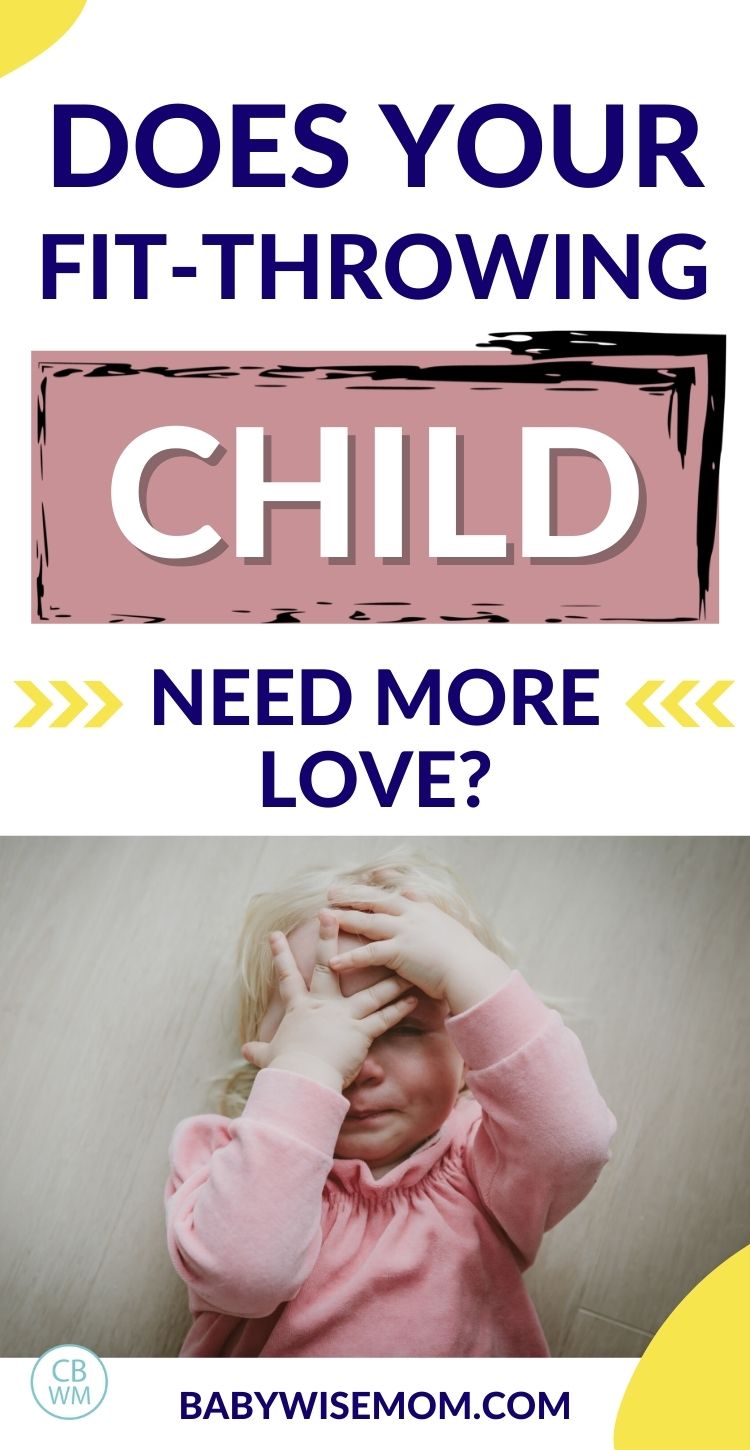Sometimes a child who is misbehaving or throwing fits is doing so because she feels unloved. Here is what to do about it.

How does a child love–what drives a child’s display of love and affection?
In The Five Love Languages of Children, Chapman and Campbell say that while adults strive for unconditional love and often reside in reciprocating love, children aim for neither.
“Being immature, a child loves in a self-oriented fashion”.
(page 123)
Children are not concerned about how loved you feel–their focus is on how they feel.
Post Contents
Children Misbehave When they Feel Unloved
If a child feels low on the love, he will typically act out in some fashion.
Chapman and Campbell suggest parents ask themselves “What does my child need when she misbehaves?” (page 124).
In other words, don’t just think about what kind of consequence might be needed, but think about what the child might be lacking that is leading to the misbehavior.
The authors say that wondering how to correct behavior before first addressing needs then we cannot fix the problem–until the child feels loved.
Misbehaving Is Not Okay
“When a child obviously misbehaves, what he has done should not be condoned”.
(page 125)
So the authors are not suggesting we ignore inappropriate behavior.
The point is that punishing behavior that is motivated by a need will not correct the behavior on a long-term scale. If a child is acting out because she needs more time with you, putting her in time-out or taking away a privilege isn’t going to correct the behavior, and when behavior doesn’t change; correction did not take place as we read in the -wise books.
There are of course other reasons a child misbehaves that are issues to address.
Sometimes children misbehave because they are in pain–teething, sickness, etc. all contribute to less than desirable behavior. Hunger and thirst are other contributors, as is lack of sleep.
As was mentioned earlier, you don’t condone behavior even if the behavior was motivated by something like “I was throwing a major fit because I was so tired.”
Exactly how you react in situations where you can easily see the behavior has an outside influence really should vary with age.
The two year old throwing the tantrum when she is getting her molars in should get more leeway than the five year old screaming and crying because she is tired.
I always explain to my children that even if they are tired, hungry, upset, etc., they do not get to be unkind or disrespectful. A huge goal in life is to learn to handle life with grace even when we are experiencing undesirable circumstances.
As a mom, I get tired (especially with a new baby), and I know when I am tired, I am less patient.
Parents Need Patience With Misbehavior
Does being tired excuse my lack of patience? No–absolutely not.
It does explain it, though.
I can know I am not just some grumpy person who needs an attitude adjustment–I am a tired mom. However, even when I am tired, I need to be patient as hard as it is.
And we adults all make mistakes right? We all lose our patience when we are sick or tired. If we feel like we are not loved we can get snappy with our spouses. It happens.
Because adults do it, we know children will be even more prone to it than we are. We want to teach our children that they control their attitudes and that they are not victims of circumstances.
We also want to teach them to be kind, respectful, and obedient despite the obstacles of life.
And we need to take measures to remedy the situation. If the child is acting out because she feels unloved, we need to do our part to meet those love needs. If it is because she is tired, we need to make sure we are getting her down for naps/rest time/bedtime on time.
When my children act out for reasons of love tank issues or physical issues, my first step is often to hold them in my lap until they calm down.
We then talk about the appropriate way to act and how we need to be kind even when we don’t feel good. We then move on to a consequence if needed.
As you reach discipline issues, remember your child’s love needs and that the way she displays love–her motivating force–is different from yours.
Conclusion
I think children have a great capacity for unconditional love, but if a child is feeling insecure in your love for her, she will react strongly as she seeks reassurance for that love.
Be sensitive to those times and those needs. Doing so will help you to have greater success with your discipline and correction.
Related Posts
- Identifying Your Child’s Primary Love Language
- How To Show Your Child Love Through Acts of Service
- How to Show Your Child Love Through Gifts
- How To Show Your Child Love Through Quality Time
- How to Show Your Child Love Through Words of Affirmation
- How To Show Your Child Love Through Physical Touch
- Discipline 101: The basics of correcting children

